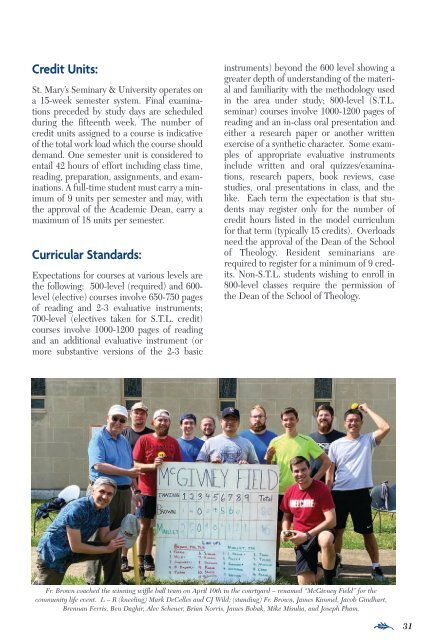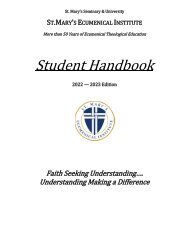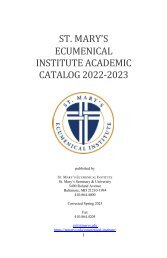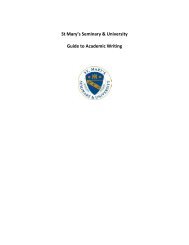School of Theology Catalog 2021
St. Mary's Seminary & University academic catalog for the School of Theology for the 2021-2022 academic year.
St. Mary's Seminary & University academic catalog for the School of Theology for the 2021-2022 academic year.
You also want an ePaper? Increase the reach of your titles
YUMPU automatically turns print PDFs into web optimized ePapers that Google loves.
Credit Units:<br />
St. Mary’s Seminary & University operates on<br />
a 15-week semester system. Final examinations<br />
preceded by study days are scheduled<br />
during the fifteenth week. The number <strong>of</strong><br />
credit units assigned to a course is indicative<br />
<strong>of</strong> the total work load which the course should<br />
demand. One semester unit is considered to<br />
entail 42 hours <strong>of</strong> effort including class time,<br />
reading, preparation, assignments, and examinations.<br />
A full-time student must carry a minimum<br />
<strong>of</strong> 9 units per semester and may, with<br />
the approval <strong>of</strong> the Academic Dean, carry a<br />
maximum <strong>of</strong> 18 units per semester.<br />
Curricular Standards:<br />
Expectations for courses at various levels are<br />
the following: 500-level (required) and 600-<br />
level (elective) courses involve 650-750 pages<br />
<strong>of</strong> reading and 2-3 evaluative instruments;<br />
700-level (electives taken for S.T.L. credit)<br />
courses involve 1000-1200 pages <strong>of</strong> reading<br />
and an additional evaluative instrument (or<br />
more substantive versions <strong>of</strong> the 2-3 basic<br />
instruments) beyond the 600 level showing a<br />
greater depth <strong>of</strong> understanding <strong>of</strong> the material<br />
and familiarity with the methodology used<br />
in the area under study; 800-level (S.T.L.<br />
seminar) courses involve 1000-1200 pages <strong>of</strong><br />
reading and an in-class oral presentation and<br />
either a research paper or another written<br />
exercise <strong>of</strong> a synthetic character. Some examples<br />
<strong>of</strong> appropriate evaluative instruments<br />
include written and oral quizzes/examinations,<br />
research papers, book reviews, case<br />
studies, oral presentations in class, and the<br />
like. Each term the expectation is that students<br />
may register only for the number <strong>of</strong><br />
credit hours listed in the model curriculum<br />
for that term (typically 15 credits). Overloads<br />
need the approval <strong>of</strong> the Dean <strong>of</strong> the <strong>School</strong><br />
<strong>of</strong> <strong>Theology</strong>. Resident seminarians are<br />
required to register for a minimum <strong>of</strong> 9 credits.<br />
Non-S.T.L. students wishing to enroll in<br />
800-level classes require the permission <strong>of</strong><br />
the Dean <strong>of</strong> the <strong>School</strong> <strong>of</strong> <strong>Theology</strong>.<br />
Fr. Brown coached the winning wiffle ball team on April 10th in the courtyard – renamed “McGivney Field” for the<br />
community life event. L – R (kneeling) Mark DeCelles and CJ Wild; (standing) Fr. Brown, James Kimmel, Jacob Gindhart,<br />
Brennan Ferris, Ben Daghir, Alec Scheuer, Brian Norris, James Bobak, Mike Misulia, and Joseph Pham.<br />
31







